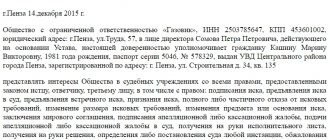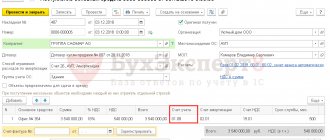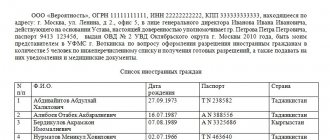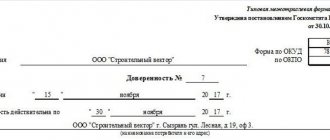Who and to whom can issue a power of attorney for the right to sign
Legal entities issue such documents, as a rule, to their employees: lawyers, chief accountants, heads of departments, etc. The document is usually drawn up by either the secretary or the company’s lawyer, then the power of attorney is handed over to the manager for signature.
Do not use sub-power of attorney - it is better to issue a power of attorney to several persons at once.
Sometimes powers of attorney are issued with the right of substitution, but this entails the need to have this document certified by a notary. Therefore, most often, the management of organizations prefers to issue powers of attorney to several representatives at once.
How to revoke a power of attorney issued by a legal entity (certified or not notarized)
The procedure for revoking any powers of attorney is specified in paragraph 1 of Art. 188 Civil Code of the Russian Federation. Accordingly, the cancellation of transferred powers on behalf of a legal entity is possible in two ways:
- By drawing up a written document containing information that the power of attorney has been revoked.
- Through a notary, who has the right to revoke any power of attorney, including a non-notary one.
If there is a risk that the representative will continue to use the power of attorney, it is recommended to use the services of a notary. There is no point in sparing money on this, since the consequences of improperly notifying a representative about the revocation of a power of attorney can cost much more, including in the conduct of court cases. When registering the cancellation of the grant of powers through a notary, legally significant actions to notify the representative are considered completed by default.
Main features of a power of attorney for the right to sign
The power of attorney can be general (with unlimited powers); special (for carrying out instructions during a designated period) or one-time (for the implementation of one specific task).
If a power of attorney is filled out to sign strictly defined documents, they must be entered very clearly, preferably each document as a separate subparagraph.
A power of attorney can be presented to any organization: both government (courts, tax inspectorates, post offices, extra-budgetary funds, etc.) and commercial (banks, other organizations and enterprises).
There are no clearly defined standards for filling out a power of attorney; however, when drawing it up, you must follow the basic rules recommended in office work when issuing documents of this kind. Among other things, a power of attorney for the right to sign documents must necessarily include information about the principal and personal information about the authorized person. The validity period of the power of attorney and signatures of both parties must also be indicated here.
It should be noted that the broader the powers of the trustee, the more detailed information about the parties should be included in the power of attorney.
Revocable and irrevocable powers of attorney. Is it possible to revoke an irrevocable power of attorney?
As the name suggests, a revocable power of attorney can be revoked at any time, but an irrevocable power of attorney cannot. However, special rules of Art. 188.1 of the Civil Code of the Russian Federation, which allow their issuance only in strictly defined cases. Thus, it is impossible to arbitrarily indicate in a power of attorney that it is irrevocable - it is necessary first of all to ascertain whether such a possibility is permitted by law or not.
An entry on the irrevocability of rights can be made if two conditions are met in combination:
- The document was issued to fulfill or secure the obligations of the person represented to the representative or third parties on whose behalf or in whose interests the representative acts.
- Liabilities are related to business activities.
Any irrevocable power of attorney must be certified exclusively by a notary, otherwise it has no legal force. In addition, it must directly indicate that the possibility of revocation is limited (in accordance with paragraph 1 of Article 188.1 of the Civil Code of the Russian Federation).
A logical question arises: how to revoke a power of attorney (irrevocable) and is it possible to do this? By virtue of para. 2 p. 1 art. 188.1 of the Civil Code of the Russian Federation, even the type of power of attorney in question can be revoked if the representative abuses his powers or there are circumstances due to which one can come to the conclusion that abuse may occur in the future.
How to write a power of attorney for the right to sign documents
- At the very top of the document the word “Power of Attorney” is written and the number of the power of attorney for internal document flow is indicated, if necessary. Below, in one line, the locality in which the document is drawn up and the date of its completion (day, month (in words), year) are indicated.
- Next, you should enter the details of the legal entity-trustor : the full name of the enterprise (indicating its organizational and legal form), OGRN, INN, KPP (can be found in the constituent papers of the organization), its legal and actual address.
- Then we fill in the position of the employee on whose behalf this document is being drawn up. Usually this is a director, general director of an organization or a person authorized to sign such papers: his last name, first name, patronymic (first name and patronymic can be indicated as initials), as well as the document on the basis of which the principal acts (as a rule, in this document) should be indicated. The line is written “Based on the Charter”, “Power of Attorney” or “Regulations”).
- Now personal information about the principal. Here you enter his last name, first name, patronymic and identification document (name, series, number, when and by whom it was issued), registration at the place of residence.
- The next part of the document contains a detailed description of the powers that the principal entrusts to the authorized representative: here you need to enter a complete list of documents that the representative has the right to sign.
- Then the period for which the power of attorney was issued is indicated. In the appropriate line you should enter the date until which the power of attorney is valid. Here you can specify any period, but if there are no specific numbers, then the power of attorney will automatically be considered valid for a year from the date of signing.
- After this, you need to indicate whether the representative has the right to delegate his powers to anyone.
- Next, the authorized person puts his signature , which is certified by the head of the organization. The latter also signs the power of attorney and puts the seal of the company .
It must be said that starting from 2021, legal entities are not required to use stamps when preparing documents.
Signing personnel documentation
The Labor Code does not contain direct rules regulating the transfer of powers of the head of an organization to sign employment contracts and other personnel documents to other persons, but repeatedly mentions the very possibility of such a transfer. Thus, the article of the Labor Code of the Russian Federation determines that the rights and obligations of the employer in labor relations can be exercised, among other things, by authorized persons. At the same time, it is said that the powers of such persons are formalized in the manner established by the constituent documents of the organization and local regulations. And the article of the Labor Code of the Russian Federation notes that one of the mandatory conditions of an employment contract is information about the representative of the employer who signed the employment contract, and the basis on which this representative is vested with the appropriate powers. However, this article does not contain any specification of the procedure for delegation of powers.
The possibility of signing orders and other local regulations on personnel matters not only by the head of the organization, but also by another authorized person is also indicated by the by-laws that regulate the procedure for filling out primary accounting personnel documentation. For example, in the Instructions for the use and completion of forms of primary accounting documentation for the accounting of labor and its payment (approved by Resolution of the State Statistics Committee of Russia dated 01/05/04 No. 1; hereinafter referred to as Instructions for filling out unified forms) it is said that the order for employment (form No. T-1) can be signed not only by the manager, but also by an authorized person. However, these Instructions do not stipulate how to formalize the authority of such a person, and what changes need to be made to Form No. T-1 if it is signed by an authorized person.
Compose HR documents using ready-made templates for free
Unfortunately, the Plenum of the Supreme Court of the Russian Federation in its resolution of March 17, 2004 No. 2 “On the application by the courts of the Russian Federation of the Labor Code of the Russian Federation” also did not answer the question of how to formalize the delegation of the right to sign personnel documents. Paragraph 12 of this resolution only states that the representative of the employer is a person who, in accordance with the constituent documents of a legal entity or local regulations or by virtue of an employment contract concluded with this person, is endowed with the appropriate powers. In other words, in order to transfer the right to sign personnel documents, it is necessary to provide for the procedure for such transfer in the local regulatory act of the organization or make a corresponding clause in the employment contract concluded with an authorized person. However, the judges of the Supreme Court of the Russian Federation did not specify what specific documents can be used to confirm the temporary transfer of powers of a manager, and in particular, whether it is necessary to issue a power of attorney to an authorized person.
There are no formal grounds for issuing a power of attorney in this case, since labor legislation does not contain such a requirement. The provisions of Article 185 of the Civil Code of the Russian Federation that a power of attorney is issued to delegate the powers of a manager are not mandatory when transferring powers to sign personnel documents. Indeed, by virtue of the provisions of the article of the Labor Code of the Russian Federation, labor relations are regulated by labor legislation, which consists of the Labor Code, other federal laws and laws of constituent entities of the Russian Federation containing labor law norms. That is, the Civil Code, which contains norms of civil (and not labor) law, is not a normative legal act regulating labor relations.
However, courts do not always recognize that in order to transfer the authority of a manager to sign personnel documents, it is enough to issue an appropriate local regulatory act (for example, an order). Often, arbitrators require that in this case an additional power of attorney be issued to the authorized person (see Resolution of the Federal Antimonopoly Service of the Moscow District dated 01/09/04 No. KG-A41/10211-03). Although sometimes organizations still manage to defend in court personnel decisions made by an authorized person who acted only on the basis of an order (see resolution of the Federal Antimonopoly Service of the East Siberian District dated March 12, 2009 No. A19-7218/07-57-5-52-F02- 826/09).
Draw up local acts using ready-made templates and prepare all personnel reports
Let's draw a conclusion. To avoid challenging and recognizing as illegal personnel decisions made by an authorized person, it is better to issue a power of attorney for him. Moreover, this does not contradict the law. After all, it is clear that an authorized person, when signing employment contracts, local acts and other personnel documents, does not act on his own behalf, but represents the interests of the employing organization. And legislative regulation of the issue of representing the interests of a legal entity before third parties is provided only by the norms of the Civil Code. Therefore, if an organization, in order to avoid risks, decides to issue a power of attorney to sign personnel documents, then when drawing it up, it is necessary to take into account the provisions of the Civil Code of the Russian Federation on power of attorney.
In the power of attorney issued to the authorized person, it is necessary to indicate exactly what actions in the “personnel department” on behalf of the organization he has the right to perform, and to establish the term of office. It is also advisable to note that the authorized person acts on behalf of the organization not as an individual, but as an employee of the organization holding a certain position. This will not allow him to abuse the granted rights in the event of dismissal, and will also limit the scope of the power of attorney to the “territory” of the organization, since information from the company’s staffing table will be needed to confirm his powers.
The wording of the power of attorney in this case may be as follows:
Limited Liability Company "Lazurit-FS" represented by Director Dmitry Anatolyevich Nikolaev, acting on the basis of the Charter, authorizes Ivan Dmitrievich Petrov (indicate passport details, date and place of birth, place of residence, etc.), holding the position of head of the department, with this power of attorney personnel of the Limited Liability Company "Lazurit-FS",...
Let's summarize. Labor legislation provides for the possibility of transferring the manager’s authority to sign personnel documents to third parties. At the same time, the Labor Code of the Russian Federation does not give a clear answer to the question of how to formalize the delegation of powers of the head of an organization, requiring only that the procedure for such delegation be fixed in local regulations or constituent documents. Judicial practice often requires additional execution of a power of attorney.
Since the authorized person in the situation under consideration represents the interests of the legal entity, and the procedure for registering such representation is fixed in the Civil Code, then in the case of delegation of authority to sign personnel documents, the power of attorney is drawn up according to the rules provided for by this code.
Create a staffing table using a ready-made template Try for free
Rules for drawing up and processing a document
The document does not have a unified template that is mandatory for use, therefore it is written in any form, depending on the idea of this document and the needs of the principal. However, there is a number of information that must be contained in it without fail, these are the following data:
- about the principal and the authorized person,
- a complete list of actions that a trusted person can perform on behalf of his principal,
- the period during which it is valid,
- place and time of its compilation.
In addition, this power of attorney must contain information about its certification by a notary:
- surname, name, patronymic of the notary,
- the name of the notary office where the certification took place,
- document registration number.
The power of attorney can be issued either on a regular standard A4 sheet or on the organization’s letterhead; it can be written either “manually” or printed on a computer, but it must certainly contain “live” signatures of the interested parties.
What is the difference between a power of attorney with the right of substitution and a regular power of attorney?
There are three most common types of power of attorney. This:
- special power of attorney (to carry out a specific matter),
- limited power of attorney (with a strictly defined period of validity),
- general power of attorney (not limited in any way).
Typically, each of these powers of attorney is drawn up for a specific person who has the exclusive right to be a representative of his principal in certain situations and circumstances - no one else has such a right and cannot use the power of attorney.
But sometimes company managers resort to drawing up a power of attorney with the right of subrogation , which allows the trustee, based on his own vision of the situation and needs, at the right time, on his own behalf, to write a power of attorney to perform the duties assigned to him by the trustor to another person.
Moreover, the circle of such individuals is usually not limited, unlike the validity period of the power of attorney itself - it cannot exceed the period specified in the main document.
It must be said that this type of power of attorney is not very common, since instead of it, company directors, if necessary, prefer to write several identical powers of attorney at once for those people they know personally.
Results
Thus, the answer to the question: how to revoke a power of attorney is quite simple - you need to carry out one of the legally significant actions suggested above, and notify the attorney and interested third parties about the revocation of the document.
If you carry out the procedure in accordance with the recommendations given in the article, negative consequences caused by incorrect actions can be avoided. You can find more complete information on the topic in ConsultantPlus. Free trial access to the system for 2 days.
The meaning of the validity period of a power of attorney
The powers confirmed by the power of attorney are derivative in nature. The performance of actions by a representative is based on the legal capacity and capacity of the principal. For this reason, the grounds for automatic termination of a document include death and procedures related to the limitation of legal capacity or recognition of the lack of it.
If the law allowed the possibility of issuing a power of attorney for an unlimited period, this would cause significant damage to the economy. Counterparties would have to contact the represented person and clarify the validity of the document.
Why is it necessary to notify the representative and third parties about the revocation of the power of attorney?
By virtue of paragraph 1 of Art. 189 of the Civil Code of the Russian Federation, the person who issued the power of attorney and subsequently canceled it must notify both the representative and the third parties for whose representation the document was issued. The authorized person, upon learning that his powers have been revoked, must return the original document issued to him (clause 3 of Article 189 of the Civil Code of the Russian Federation).
If the representative has not been notified, he will be able to continue to perform the actions prescribed in the power of attorney on a legal basis, with all the ensuing consequences. If the representative was notified, but continued to use the canceled power of attorney and did not return it, his actions will be considered illegitimate.
In the case where only the representative, but not third parties, are notified of the revocation of the power of attorney, they will reasonably consider the powers of the representative to be valid, and accordingly, all his actions will be recognized as performed in the interests of the represented one (Clause 2 of Article 189 of the Civil Code of the Russian Federation).
Notification of document revocation can be done in several ways:
- Automatically, after the cancellation of any power of attorney through a notary, the next day after information about this is published in the register of notarial actions.
- By sending (or transferring) to the attorney and third parties a written document containing information about the revocation of the power of attorney - from the moment of receipt of the notification.
- After a month has passed after the publication of information in the Kommersant newspaper (the signature on the publication is required to be notarized, so you will have to visit a notary in this case as well).








